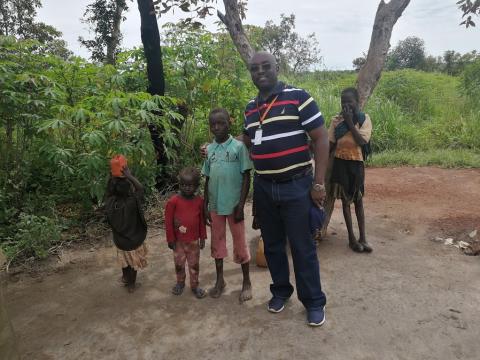Catch them young: Three challenges to the WASH sector to accelerate handwashing

By Dr Fungai Makoni, WASH Regional Programme Director, World Vision East Africa Region
When my daughters were doing their first grade in Harare, Zimbabwe, I went to their schools while I was working for the Institute of Water and Sanitation Development. I worked with the teachers on how to help younger students understand and practice health hygiene behaviours – particularly the importance of washing their hands
The teachers found creative ways of imparting this type of knowledge to younger children. It was so exciting to see how the children became the gate keepers of the behavioural change. Even in my own home my daughters would remind me when I would grab a fruit without washing hands that I should wash my hands first. They had internalized the importance of washing one’s hands and, therefore, grew up with those principles and habits.
This experience and many, many others over 20 years’ experience in the water, sanitation and hygiene (WASH) sector have reinforced the adage: “you cannot teach an old dog new tricks.” As I reflect on these experiences, I think development practitioners would do well to keep these three challenges in mind as they pursues effective and sustainable hygiene behaviour change.
Stop the prescriptive approach
As development practitioners, we have been overly prescriptive in our approach. We often assume that we know what people want or need when we design interventions. We need to take time to understand the barriers and determinants for behaviour. Often the approach is telling people what to do. Let’s first of all understand the dynamics of culture and then build in the approach based on that.
At World Vision we use the Designing for Behaviour Change framework to help understand and design interventions that address social norms and other barriers to behaviour change. We still have much to learn in focusing on effective behaviour change, rather than ticking boxes of targets. That’s the major challenge development and humanitarians face and hence that is what we are choosing to work on.
Engage the young
We make the mistake of segregating and deselecting in our community engagement processes. We often only look for adults and chase the children away, and that is where we miss the point. Children are often our best partners – eager to learn and share their knowledge with others. They also have observations and insights that, if we slow down and listen, could help make our programmes much more effective. It has also been shown that children are the best agents for change in most communities. As we focus on reaching the young, we are empowering change agents for sustainable behaviour change.
Remember it’s a process, not an event
We have to remember that hygiene behaviour takes time. It’s not an event. It’s a gradual process. We are learning much about this through the WASHUP! Initiative we are implementing with our partner Sesame Workshop. We begin with very young school children – even those in Kindergarten – and use fun and play to help children adopt healthy hygiene and sanitation behaviours.
Sunday, 15 October, is Global Handawashing Day. Learn more about what World Vision is doing to cleebrate the day through a webinar with our partners Sesame Workshop, focusing on the WASHUP! initiative.
